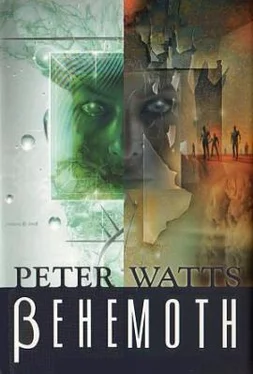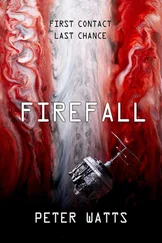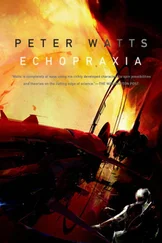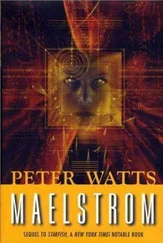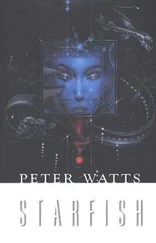"We just got here," Clarke murmured.
"Yup. Usually I blast the music for a couple of minutes, just to let people know. But a lot of the time it isn't even necessary."
Clarke panned the street. A dozen now, at least. "Somebody really spread the word."
"And that," Ouellette told her, "is how we're going to win."
Bucksport was one of Ouellette's regular stops. The locals knew her, or at least knew of her. She knew them, and ministered unto them as she always had, her omnipresent music playing softly in the background. The sick and the injured passed like boluses of food through Miri's humming depths; sometimes the passage would take only moments, and Ouellette would be waiting at the other side with a derm or injection, or some viral countervector to be snorted like an antique alkaloid. Other times the patients would linger inside while the MI knitted their bones back together, or spliced torn ligaments, or burned out malignancies with bursts of focused microwaves. Occasionally the problem was so obvious that Ouellette could diagnose it with a glance, and cure it with a shot and a word of advice.
Clarke helped when she could, which was rarely; Miri maintained its own inventories, and Ouellette had little need of Clarke's limited expertise in fish bites. Ouellette taught her some basics on the fly and let her triage the line-up. Even that wasn't entirely successful. The rules were easy enough but some of the younger ferals recoiled at Clarke's appearance: the strange black skin that seemed to ripple when you weren't quite looking; the little outcroppings of machinery from flesh; the glassy, featureless eyes that both looked at you and didn't, that belonged not so much to a human being as to some unconvincing robot imposter.
Eventually Clarke contented herself with the adults, and gave them vital tips while they waited their turn. There was, after all, more to dispense than medical attention. Now, there were instructions.
Now, there was a plan.
Wait for the missiles, she told them. Watch the starbursts; track the fragments as they fall, find them on the ground. This is what you look for; this is what it is. Take whatever samples you can—soil in mason jars, rags swept through aerosol clouds at ground zero, anything. A teaspoon-full might be enough. A tin can, half full, could be a windfall. Whatever you can get, however you can get it.
Be fast: the lifters may be coming. Grab what you can and run. Get away from the impact zone, hide from the flamethrowers any way you can. Tell others, tell everyone; spread the word and the method. But no radio. No networks, no fiberop, no wireless. The ether will fuck you up the ass if you let it; trust only to word-of-mouth.
Find us at Freeport, or Rumford, or places between. Come back to us: bring us what you have.
There may be hope.
Augusta made her skin crawl. Literally.
They approached from the east, just before midnight, along the 202. Taka took them off the main drag in favor of a gravel road a short ways down the gentle slope of the Kennebec River valley. They parked on a ridge that overlooked the shallow topography below.
Everything this side of the river had been abandoned; almost everything on the far side had been, too. The bright core that remained huddled amidst a diffuse spread of dark, empty ruins left over from the good old days. Its nimbus reflected off the cloud bank overhead, turned the whole tableau to grainy, high-contrast black-and-white.
Faint gooseflesh rippled along Clarke's arms and nape. Even her diveskin seemed to be, well, shivering , a sensation so subtle it hovered on the threshold of imagination.
"Feel that?" Ouellette said.
Clarke nodded.
"Static-field generator. We're just on the outer edge of the field."
"So it gets worse inside?"
"Not right inside, of course. The field's directed outward. But yeah, the closer you get to the perimeter, the more your hair stands on end. Once you're inside you don't feel it. Not that way, at least. There are other effects."
"Like what?"
"Tumors." Ouellette shrugged. "Better than the alternative, I guess."
A cheek-to-jowl cluster of lights and architecture rose against the dark, its outlines suggesting the contours of a crude, pixelated dome. The new Augusta was obviously squeezing every cubic centimeter it could out of the safe zone. "We going in there?" Clarke asked.
Ouellette shook her head. "They don't need us."
" Can we go in there?" For all its lost stature, Augusta must still have portals into the pipe. Lubin might have been better off sticking with them after all.
"You mean, like shore leave? Stop by on our way through for some VR and a hot whirlpool?" The doctor laughed softly. "Doesn't work that way. They'd probably let us in if there were some kind of emergency, but everybody kind of sticks to their own these days. Miri's out of Boston."
"So you could get into Boston." Even better.
"It is kind of beautiful at night, though," Ouellette remarked. "For all its carcinogenic properties. Almost like the northern lights."
Clarke watched her without speaking.
"Don't you think?"
She decided not to push it. "Night looks pretty much like day to me. Just not as much color."
"Right. The eyes." Ouellette gave her a sideways look. "Don't you ever get tired of daylight all the time?"
"Not really."
"You should try taking them out now and then, just for a change. Sometimes when you see too much, you miss a lot."
Clarke smiled. "You sound like a fortune cookie."
Ouellette shrugged. "It wouldn't hurt your bedside manner, either. Patients might relate to you better without the affect, you know?"
"There's not much I can do for your patients anyway."
"Oh, that's not—"
"And if there is," Clarke continued, her voice conspicuously neutral, "then they can accept my help without dictating my wardrobe."
"Rrrright," Ouellette said after a moment. "Sorry."
They sat in silence for a while. Finally Ouellette threw Miri back into gear and cued her music— an adrenaline discord of saxophone and electric percussion at serious odds with her usual tastes.
"We're not stopping here?" Clarke asked.
"Goosebumps keep me awake. Probably not all that good for Miri either. I just thought you'd enjoy the view, is all."
They headed further along the road. The prickling of Clarke's skin faded in moments.
Ouellette kept driving. The music segued into a spoken interlude with musical accompaniment—some story about a hare who’d lost his spectacles, whatever those were. "What is this?" Clarke asked.
"TwenCen stuff. I can turn it off if you—"
"No. That’s fine."
Ouellette killed it anyway. Miri drove on in silence.
"We could stop anytime," Clarke said after a few minutes.
"A little further. It's dangerous around the cities."
"I thought we were past the field."
"Not cancer. People." Ouellette tripped the autopilot and sat back in the bucket seat. "They tend to hang around just outside the claves and get envious."
"Miri can't handle them?"
"Miri can slice and dice them a dozen ways to Sunday. I'd just as soon avoid the confrontation."
Clarke shook her head. "I can't believe Augusta wouldn't have let us in."
"I told you. The claves keep to themselves."
"Then why even bother sending you out? If everyone up here is so bloody self-centered, why help out the wildlands in the first place?"
Ouellette snorted softly. "Where've you been for the past five years?" She held up her hand: "Stupid question. We're not out here for altruism, Laurie. The MI fleet, the salt licks—"
"Salt licks?"
"Feeding stations. It's all just to keep the ferals from storming the barricades. If we bring them a few morsels, maybe they won't be quite so motivated to bring ßehemoth into our own backyards."
Читать дальше
